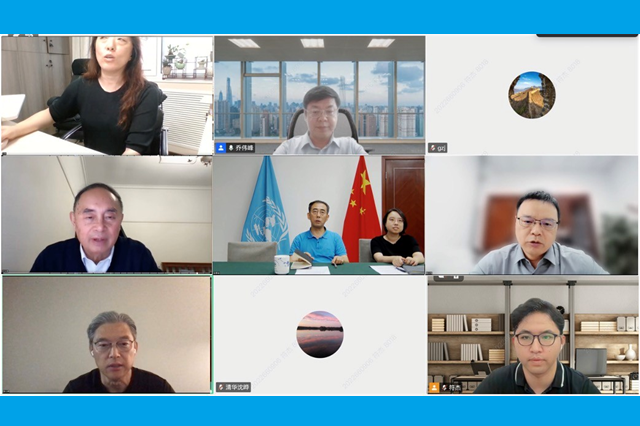Position: Home> Media Center > Industry News

On July 3, 2025, the Chinese Commission for UNESCO held an online meeting to conduct a research and exchange session on the STEM education work of the UNESCO International Centre for Engineering Education (ICEE). Participants included QIN Changwei, Secretary-General of the National Commission for UNESCO; GE Siying, Deputy Secretary-General; GUO Zhijun, Level 4 Investigator from the Education Office; YANG Yongheng, Director of the Office of Arts, Humanities and Social Sciences Administration and Center of Tsinghua Think Tanks; LIU Chang, Deputy Director of the Office of Arts, Humanities and Social Sciences Administration; WANG Sunyu, Executive Deputy Director and Secretary-General of ICEE; QIAO Weifeng, Associate Professor in Research; XU Lihui, SHEN Ye, Assistants to Secretary-General of ICEE; and FU Jie, Postdoctoral Researcher. The meeting was chaired by Secretary-General QIN Changwei.
Secretary-General QIN Changwei first introduced the background of the meeting. He emphasized that China is currently in the critical phase of implementing the Outline for the Construction of an Education Power (2024–2035) and its Three‑Year Action Plan. He expressed the hope that ICEE would take the evaluation and contract renewal as an opportunity to strengthen its internal development and assume greater responsibilities in promoting international cooperation and talent cultivation in engineering education. He also highlighted strong support for the establishment of UNESCO’s Category I institute, the International Institute for STEM Education, soon to be established in Shanghai, expecting it to play a greater role in high-quality STEM education development and global governance.
Professor YANG Yongheng pointed out that Tsinghua University actively leverages its multidisciplinary research strengths to consult on significant issues across various fields, providing notable contributions to decision-making and policymaking. He stated that Tsinghua University attaches great importance to ICEE’s development and will continue to utilize its synergistic innovation strengths in engineering and education disciplines to support the growth of ICEE, contributing to sustainable development. LIU Chang, Deputy Director of the Office of Humanities, expressed actively support for the ICEE’s work.
WANG Sunyu and QIAO Weifeng reported on ICEE’s achievements since its establishment, shared insights from UNESCO expert evaluations, and outlined future development plans. WANG Sunyu highlighted the importance of STEM education to modern industrial advancement and addressing global challenges, recommending further cooperation among universities, enterprises, and governments to create a more efficient and comprehensive education system integrating industry, academia, and research. QIAO Weifeng presented ten specific recommendations based on ICEE’s experiences for the establishment of the UNESCO Category I Institute for STEM Education.
XU Lihui, SHEN Ye, and FU Jie, drawing on their experiences in international cooperation and practice, suggested enhancing lateral cooperation among international organizations, especially between UNESCO Category II centers and university-enterprise collaboration, establishing regular exchange mechanisms, and effectively utilizing academic journals for international dissemination.
In conclusion, QIN Changwei fully acknowledged ICEE’s accomplishments. He emphasized the need to better leverage the UNESCO platform to actively foster international collaboration and exchanges in engineering education, promoting high-quality development. QIN recommended that ICEE further deepen research on engineering education standards, continue to strengthen international cooperation networks, collaborate effectively with domestic and international universities and industry partners, organize international conferences and forums leveraging Tsinghua University’s academic advantages, introduce new topics in engineering education, share experiences, actively encourage international exchanges of teachers and students, and robustly support the Shanghai-based International Institute for STEM Education. He stated that the National Commission would support the ICEE’s research on the practical exploration of STEM education in Chinese universities.
 京公网安备 110402430053 号
京公网安备 110402430053 号